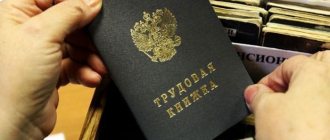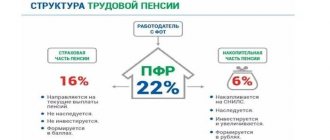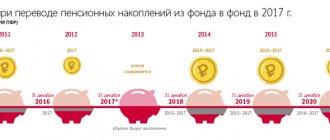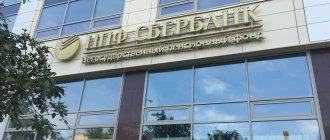Is it possible to receive the funded part of a pension for a deceased relative?
Receiving payments is possible if the deceased person was insured and made contributions to replenish the pension. Only heirs can receive the accumulated funds, among whom the money will be distributed as when dividing any property.
Attention! It will not be possible to receive money if a person received a pension payment in full before his death.
Heirs have the right to receive funds that have not yet been paid to the pensioner. If a person has paid a pension for a certain period, then after his death the heirs will only be able to count on the remaining amount of savings. Payment of funds will not be possible if the account was emptied during the person’s lifetime.
Husband's funded pension
The death of a loved one is not only a sad event, but also a costly process. However, the husband’s pension, which he did not manage to receive, will help reduce funeral expenses.
In addition to the funded part, the wife can apply for the insurance part. It is transferred to the wife's account. Thus, if a woman’s pension amount was less than her husband’s, after his death she can transfer to his pension.
The savings portion can be received in the entire amount at once. An alternative option is to transfer funds to the wife’s personal account in the Pension Fund of the Russian Federation.
Important! Due to the fact that the funded part of the pension is the personal property of the citizen, relatives can only receive it, and not fixed benefits or state benefits of the pensioner.
The savings part can be equated to deposits. Thus, in accordance with Federal Law No. 11 “On investing the funded part of a pension” of June 24, 2002, immediate relatives have the right to inherit the contribution of the deceased.
It is not difficult to determine the circle of persons claiming to receive an inheritance. They are determined by Federal Law No. 173 of December 17, 2001. Most often, parents, children, grandchildren, sisters, and brothers apply for payment.
The wife claims to receive the inheritance first, if other persons are not described in the will. Funds are inherited only if they are not transferred to the pension account.
The wife has the right to receive all parts of the funded pension if none of the immediate relatives applies for possession of the deceased’s funds.
Is this an inheritance
Every citizen of the Russian Federation is obliged to pay funds towards the formation of his pension. The list of compulsory pension insurance also includes a funded part.
Contributions to the Pension Fund are formed from the following types of payments:
- Maternal capital . It is included in the amount of the funded pension if the parents decide to use the money received to form future contributions.
- Profit from investing funds in various savings programs.
- Funds paid by citizens personally . This may be an initiative of the individual himself or an obligation for self-employed persons.
- Contributions from the employer if the citizen is employed under an official employment contract.
The legislation fully allows heirs to receive the funded part of the pension if the deceased person did not manage to realize it in his own interests.
This applies both to situations where a person passed away before retirement, and when a person, after retirement, continued working in order to increase the final size of the funded portion, but died before the payments were made. Therefore, funds are inherited in accordance with all the rules established for relatives.
How does inheritance work?
The procedure for inheriting a funded pension does not differ from the algorithm provided for other property. A citizen must declare his right to inheritance within six months and submit the necessary papers that can prove the degree of relationship between the applicant and the deceased person.
Further, the inheritance procedure will depend on the number of heirs. If there are several of them, then the remaining amount will be divided among all claimants to the property, and if there is only one heir, all the money will go to him.
Reference! The exception is when the distribution of property is carried out on the basis of a will drawn up by a person before his death. Then the funds are distributed in accordance with the will of the testator.
Who can receive funds?
To inherit the funded part of the pension, you need to familiarize yourself with the articles of Federal Law No. 173. The circle of persons who can count on payment after the death of the insured citizen is also listed here.
Persons who belong to the heirs of the first and second stages will be able to receive payment from the funded part . These include husband or wife, children, parents, brothers, sisters. If these categories of persons have the opportunity to receive a payment, then there are also those groups that have a guaranteed right to receive a pension for a deceased person.
Such persons include those who were dependent on the deceased for at least one year. But in order to receive a payment to a dependent, you will need to take into account several important nuances, without which the funds cannot be paid.
A ban on receiving an inheritance may be imposed if a person has been recognized as an unworthy heir. In this case, the person is deprived of even the guaranteed right to payment of funds. Access to pension savings if the fact of unworthiness is confirmed can be prohibited only by a court decision.
The decision to deprive the right is made by the court based on the following factors:
- The person committed unlawful acts against the deceased. Such actions include harm to health and attempted murder.
- The person did not fulfill his obligations to the deceased. For example, a person refused to pay alimony.
Funds can be allocated not only in full, but also in partial amounts . This is possible if there are several heirs who are included in the same queue. Then all pension savings are divided between the heirs into equal parts.
Important! In controversial situations, relatives go to court to fairly divide the payments.
An additional way to resolve the issue regarding the distribution of a funded pension is a will executed by a person before his death. If the heirs disagree with the provisions of the will, they can be challenged in the courtroom. If there are no contradictions or illegal actions in the execution of the document, the claim to change or invalidate the provisions of the will will be rejected.
The legislative framework
In accordance with current Russian legislation, a wife has the right to receive the funded part of her deceased husband’s pension. The right also extends to other close relatives of the deceased. The amount of funds is provided in equal proportions for each person who applies.
The wife has the right to receive the funded part of her deceased husband’s pension on the basis of Federal Law N173 “On Labor Pensions in the Russian Federation” dated December 17, 2010. Paragraph 3 of Article 23 of Federal Law No. 173 says that savings that a pensioner did not manage to receive cannot in any way affect the funeral benefit. In addition, they are not inherited.
However, within six months from the moment of death, the next of kin of the deceased have the right to apply to the Pension Fund of the Russian Federation to receive the unpaid balance of the funded pension. Everyone is given an equal share.
Persons who have the right to apply for payment are described in paragraph 2 of Federal Law N173 of December 17, 2010:
- wife husband;
- children;
- grandchildren;
- siblings;
- parents.
How to apply for a survivor's pension?
Is it possible to stay in your mother-in-law’s apartment if your husband has died? Read here.
Can a daughter-in-law claim her mother-in-law's inheritance? Read the link:
Important! Receipt of funeral benefits is not taken into account when calculating the amount of payments for part of the deceased's funded pension.
Each of the applying relatives has the right to receive an equal share, calculated according to the formula: Payment = Amount of savings/number of relatives applying for payment.
If the relatives did not manage to receive the deceased’s pension within six months from the date of death, the entire amount goes to the inherited property. Now you can receive payment in accordance with the rules of inheritance.
Attention! Our qualified lawyers will assist you free of charge and around the clock on any issues. Find out more here.
Process of receiving money
To receive pension savings as an inheritance, you will need to act in accordance with the conditions of Russian legislation. The issue of inheritance is considered in the RF PP No. 471.
To make a payment you will need to follow the algorithm:
- Find out all the necessary information.
- Collect documents.
- Go to the Pension Fund with the collected papers.
- Submit an application with documentary evidence to receive payment.
- By decision of the council, funds will be sent to the specified details or the application will be rejected.
Sample application for receiving a funded part of a pension for a deceased relative:
List of required documents to receive savings in the form of an inheritance:
- passport;
- birth certificate (if a minor is to receive funds);
- court order to extend the period for filing an application (if the period for filing an application was missed);
- confirmation of the degree of relationship between the applicant and the deceased person;
- death certificate;
- power of attorney (for representatives only);
- SNILS of the deceased person;
- details where the money must be sent if the council’s decision is positive.
An important nuance is to fill out the application correctly. If the application is not made according to the form, the pension fund employees will reject the application. There should be no corrections or blots in the finished document; they will be another reason for rejecting the application.
The generally accepted form of the document includes the following points:
- Applicant details (full name).
- Who is this person related to the deceased person?
- Passport details.
- Grounds for receiving a pension.
- Details for transferring funds.
- Temporary or permanent registration address.
- Number and signature of the applicant.
If the application is rejected, the citizen has every right to appeal the decision in court.
The documents and application must be submitted to the local PF office. Transfer of documents is allowed not only during a personal visit to the institution, but also through a third party, who must have a power of attorney from the applicant. If it was decided to send the papers by mail, then this can only be done using a registered letter with a list of attachments.
The legislation allows you to apply to the fund in accordance with the standard deadlines for registering an inheritance - 6 months from the date of death of a person . It is possible to submit an application without taking into account the deadline only in exceptional circumstances, when the heir was not informed or did not have the physical opportunity to be present during the division of property.
Important! The pension fund has five working days from the date of application to process the received application.
If the pension fund decides that the applicant has every reason to receive a payment, then a positive response to the application is issued. The funds will be transferred to the person by the 15th of the next month.
An applicant may be refused if the following facts were revealed during processing of the application and documents:
- Not a complete set of papers is presented.
- The application contains errors, inaccuracies or corrections.
- The submitted documents are fake.
- Incorrect information was transmitted.
- There are no grounds for payment.
The commission's decision may be challenged. To do this, the applicant must draw up and submit a petition to appeal the decision.
Nuances
Legislation allows citizens of the Russian Federation to store their pension savings in state and non-state funds. Therefore, the place of circulation will depend on where exactly the deceased person kept the funds. The procedure for registering and receiving savings will be carried out under the RF Regulation No. 471, regardless of the organization.
The law prohibits pension funds from requesting an expanded package of documents. Therefore, before contacting the organization, there is no need to clarify which list of papers is necessary to process the payment.
If the pension fund requests additional papers, the applicant can immediately apply to the court with a corresponding application . Such an action on the part of the PF is illegal, for which the responsible person will be punished in accordance with the administrative or criminal code.
To receive a funded pension, you need to fill out an application, collect papers and submit a complete package of documents to the pension fund. Funds will be transferred to the applicant using the specified details only if there are grounds.
Persons entitled to inherit a funded pension
The heirs (legal successors) of a funded pension, the funds of which are accounted for in a special part of the individual personal account of a deceased person, may be heirs (legal successors) upon application or heirs (legal successors) by law.
The heirs (legal successors) according to the application are the persons whom the deceased, of his own free will and desire, indicated during his lifetime in the application left with the Pension Fund at the place of residence. This statement is an administrative document of the testator for the distribution of savings funds between the heirs (legal successors) and contains specific instructions to whom and what shares of pension savings will be transferred in the event of his death.
The heirs (successors) by law are the persons specified in paragraph 6 of Art. 16 of the Law on Labor Pensions, namely, relatives of the deceased testator, who will be paid the accumulated pension funds regardless of their age and ability to work, but according to priority.
The first in line are the children of the testator, his spouse and parents. The second to benefit from this payment will be the sisters, brothers and grandchildren of the testator, as well as his grandparents. Heirs of the second stage will be paid the funded pension of a deceased person only in the absence of an application for payment of funds from the legal successors of the first stage.
As for the inheritance of a funded pension transferred to a non-state pension fund under a compulsory pension agreement, the heirs are indicated in a separate clause of such an agreement . If there are several legal successors, then their shares in the inheritance funds are also indicated. This is not a mandatory condition of the contract, therefore, in the absence of specific persons, the right of inheritance is acquired by the heirs by law.










